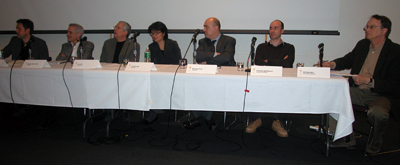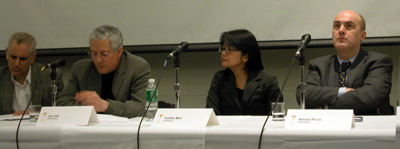anchor
Potentials; Green Week part 2
Part 2 - Faculty Panel (previously:
student panel)

From right to left:
Thomas Schroepfer,
Preston Scott Cohen,
Leland Cott,
Toshiko Mori,
Antoine Picon,
Christian Werthmann, and the Moderator
William Saunders.
William Saunders started by asking a series of questions including:
-Are we facing a global crisis, if so how can design help?
-What is the appropriate role of sustainability at the GSD?
Short response and intro by the speakers:
Mori: quoting the governator, she said that Global Warming and ecological emergency are no longer debatable. Toshiko went on to propose a cross-departmental core class to give students an immersion on ecological literacy.
Picon: five points:
-the key is integration into the curriculum
-cannot fall on the pitfalls of moralistic discourse
-go beyond the object to address larger issues from material extraction to eventual dismantling
-civil engineering and the design professions will be changed radically by the environmental situations
-as a historian asks: is growth always good?
Cott: We have to re-think the curriculum. He talked about examples of design studios he has taught that have sustainability at their core. He also talked about his practice and his latest
LEED platinum project.
Cohen:
-is this too large of a problem for a single piece of architecture to solve?
-agrees with Picon's comments on moral grandstanding.
-is today's situation really that different historically?
-concluded that architects should just continue to do whatever they want and sort out how that can help with environmental issues later.
comment: I felt like Scott Cohen started off a little weirdly. What does he mean what can each individual building do: a lot! Material selection, etc... can do a lot for the environment. My belief is that it is the responsibility of each individual building to make a change. He is right, however that if there is not a major shift in the architecture and urban planning culture even the most well-meaning buildings will not be able to stop that 48% fossil fuel energy use and other resource depletion. That shift has to begin with each individual building and designer. Also, it is a different historical event because, as far as I know, there has never been an unsustainable period as long as we are just finishing. We are inheriting three generation's of uncontrolled growth and a lack of interest in the issues, this is new.
Schroepfer: He is doing research looking at green buildings and communities to see if the results actually match the initial claims of sustainability.
Werthman: He is working on the green roof at the GSD. Core responsibility of design professionals: to not make spaces that harm culture while contributing an artistic cultural expression to the built environment.
Next , there was a discussion between the panelists. The best back and forth was between Scott-Cohen and Picon. Scott Cohen started saying that maybe we are more sustainable in design studios than we think, to what Picon immediately responded with utter disbelief. Picon fired back that we are not nearly close to doing enough. He sees an opportunity to finish the modern project of a process based architecture that integrates systems and performs as a machine (in this case with an environmental agenda). Leland Cott also took on Toshiko Mori's idea of a cross-departmental core class on ecological literacy and proposed starting it right away as soon as next semester as an elective. Finally, Mori and Cott also proposed a think tank to bring together the GSD faculty and the larger Harvard community in sustainability issues.
One can only hope that conversations such as these are also happening, and will continue to happen, in faculty offices and administration hallways. One question that lingers in my mind is:
why the fear of framing the issue around ethics? Every other profession has their ethical code clear, and professional designers are afraid of even mentioning the word (as per Picon's and Scott Cohen's comments). Is it fear of going back to modernism's heroic period? Is it because architecture is intrinsically tied to market and political forces? ( but ins't that the case for law and medicine also?).
The next few years should be interesting...







10 Comments
2 things -
first, that's not a round table, it's quite clearly a long rectangle...
and # 2 - did you get the feeling that these folks mean business, or that they are responding to exterior forces (students etc.)? It's nice that something is being discussed, and that something may come of it, but do you think the panelists and other profs in the school truly want to give this issue prominence?
you are right, it is definitely rectangular.
I feel like they mean business because of the pressures, no school wants to be left behind, once agin it is a leadership issue. Having said that, everyone (besides Scott-Cohen who was brought in as almost an outsider to the conversation) sounded genuinely passionate about the issues brought up. Lee Cott, Toshiko Mori, and Picon were especially passionate about their responses and thoughts on the issue. I do hope that the ideas of a core class for all the departments and the think tank don't lose steam.
why was michelle addington not included? is she still around? she used to teach a class called 'environment & energy implications for building design' at the gsd, and seemed like the most concerned teacher there on environmental issues... an expert on then, actually.
thanks for the coverage, +q, it's nice to see this is going on at the gsd.
apologizing in advance for my lengthy comment.
the question of ethics is an interesting one -- and I think you're right in thinking that the memory of academe's once unquestioning loyalty to modernism might have resulted in some wariness towards the idea. That being said, I'm suspicious of establishing an ethical credo in architecture as well, for a couple of reasons.
1. I'm suspicious of blanket statement credos (which have the potential to lead to a kind of myopic zealotry -- and yes, i realize that my statement could be read as a blanket statement, but just bear with me). I think this is especially true given a profession built upon, at its very core, the subjective interpretation of our built environment. (I know that global warming and resource depletion aren't debatable at this point, but the question of subjectivity moves into my next point.)
2. I don't know how much it would actually accomplish (past simply stating that sustainability is "good.") -- it seems to me that given any project, sustainability can be applied, strategically, using many different methods. Would a high density urban strategy that limits sprawl and decreases travel distances be considered more or less "ethical" than a strategy that employed radically different means? What are the ethics of sustainability for urban sites vs rural sites? Do we avoid talking about the suburbs b/c of the sprawl and wastage they promote, or do we take on that setting as one that is just as valid as urban/rural sites?
The outlines of a sustainable ethic has the danger of de-evolving into either a bureaucratic accounting system, a system of design prescription, or a very general address to the issue. In the end, past stating that sustainability should be addressed holistically in a design curriculum (not just technology, not just lifestyle, not just embedded energy costs, not just cultural sustainability, but all these and many more in concert), what is there to implement as an overall ethical contract?
Glenn Murcutt was here two days ago, and though I took issue with some of the things he said (he seemed to conveniently contradict himself many times), he did address the idea of holistics in sustainability -- that its not enough to make a building that is only purely energy conscious - that it must also address a sense of cultural sustainability that the project beyond sustainability.
oh, scratch my previous question. quick search told me she's now at yale. it's harvard's loss, really.
Michelle Addington is at Yale.
teaching environmental awareness is an ethical one- schools that don't are failing their duty to teach the critical abilities to understand the world we live in.
There are two ways of dealing with the subject - teaching to the LEED exam (which fails to provide broader skills) and teaching ecological literacy along with the basic tools to analyze energy flows. This is going to be tough to find good instructors for the next few years.
I was chatting with the dean of architecture from kansas and asked him where were the instructors/professors coming from who can teach what the students want/need to learn about the environment and carbon footprints. his reply was that there is a severe shortage of experience and knowledge on this subject in the institutional pipeline- then he asked me if I wanted to move to kansas to teach...
+q great reporting, I wish I could have been there.
architects and designers aint gonna change nothing. the change will happen when the people who build and or lease buildings realize what a toxic building is doing to the bottom line. these costs are accrued with sick time and litigation through class action lawsuits regarding everything from mold to migraines caused by v.o.c.s. as far as striving to be a "sustainable" architect, well i thought that was the idea all along.
treekiller, how did you find dean gaunt? KU was definitely trying pretty hard to find profs who could offer some serious, pointed courses dealing with issues ranging from building mech systems, airflow analysis, to materials research during my final year there ...
umm...it will be better if each conservatory has its own character.
but to be sustainable or not is a test for the relationship between natural and human,not only for architecture.
Block this user
Are you sure you want to block this user and hide all related comments throughout the site?
Archinect
This is your first comment on Archinect. Your comment will be visible once approved.